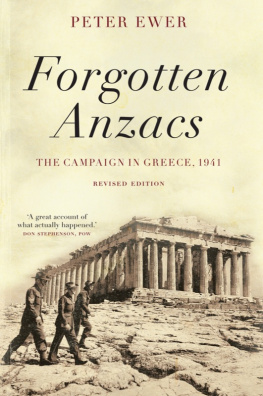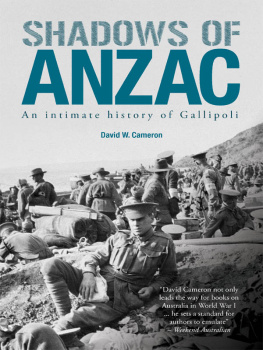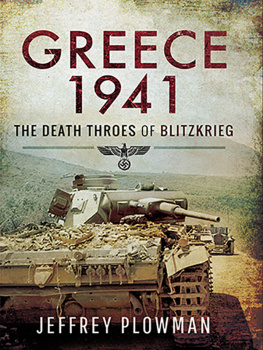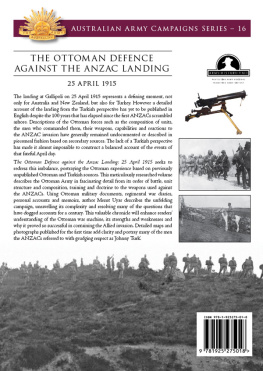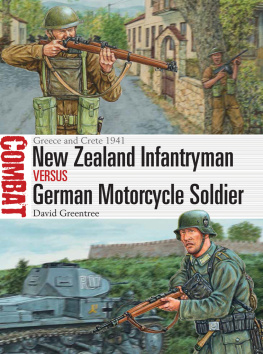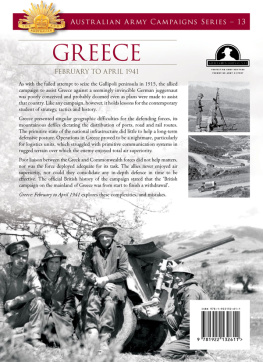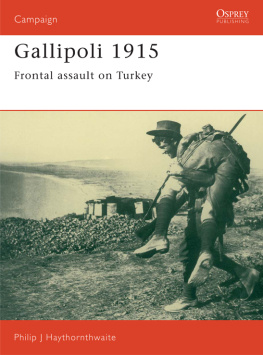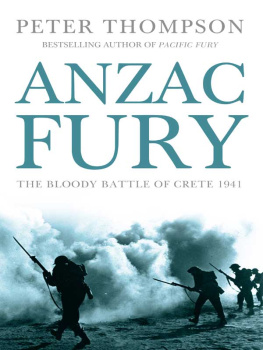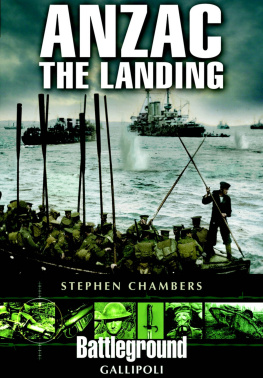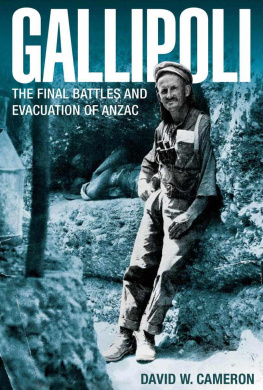
FORGOTTEN ANZACS
Peter Ewer completed a first-class honours degree in politics at Macquarie University in 1983 that won a university medal, and a doctorate in technology and culture from RMIT University in 2005 that also won a university research prize. Dr Ewer is currently an official in the Victorian Department of Justice, and has published in local and international history journals.
To all those who fought Nazism in Greece, 1941
Scribe Publications
1820 Edward St, Brunswick, Victoria 3056, Australia
2 John St, Clerkenwell, London, WC1N 2ES, United Kingdom
First published by Scribe 2008
Paperback edition published 2009; reprinted 2011
Revised hardback edition published 2016
Copyright Peter Ewer 2008, 2016
All rights reserved. Without limiting the rights under copyright reserved above, no part of this publication may be reproduced, stored in or introduced into a retrieval system, or transmitted, in any form or by any means (electronic, mechanical, photocopying, recording or otherwise) without the prior written permission of both the copyright owner and the above publisher of this book.
Maps drawn by Bruce Godden
9781925321296 (revised hardback edition)
9781925307528 (e-book)
A CIP record for this title is available from the National Library of Australia
scribepublications.com.au
scribepublications.co.uk
Contents
Preface to the 75th anniversary edition
The first edition of Forgotten Anzacs was published in 2008 not a long time ago, so the reader is entitled to ask what would warrant a revised edition, even for a significant anniversary of the campaign. When I first wrote the book, it was the literary product of a series of interviews I had undertaken with veterans of the Greek campaign, intended for a film documentary. In the course of transcribing those interviews, the book really fell onto, and then off, the computer screen, raw but ready made, an oral history of an important moment in Australian, Greek, and New Zealand history. It was around the stories of the veterans that I then organised the dry facts of military events, and the decisions of politicians, telling only so much of these as would make the lived experience intelligible to readers more than 60 years later.
The publicity that the book attracted was interesting, especially for one element of it. In closing the first edition of Forgotten Anzacs in 2008, I made the point that the Anzac veterans had never received a campaign medal for the fighting. They had been asked to make do with the North Africa Star, a catch-all honour for anyone who had been involved in the fighting in North Africa between 1940 and 1943. The oddity is obvious, Greece being some distance away from the baking sands of Egypt and Libya. In the mid-1940s, when decisions were made about these things, Canberra and Wellington were still wedded to the British system of honours, and the fighting was too inconsequential (at least in the eyes of London) for a dedicated medal to be struck for those who served.
My critique of the official slight on the veterans over the lack of a proper campaign medal resonated with many Anzac veterans (although some are quite happy with the current arrangement, it must be said), and bewildered the Australian Greek community. They could not imagine why Australian service personnel, who had given so much to help the Greeks in 1941, were not entitled to a more appropriate medal.
Greek interest in the affair was understandable, given that Athens had issued its own campaign decoration, the Greek Medal of Honour 19401941, and happily bestowed it on the Anzacs in recognition of their service. Dina Gerolymou, a producer with SBS Radio, took up the issue, but from government officials and even the Returned Services League (RSL), she got the same mantra the North Africa Star was good enough.
Officialdom has turned itself in knots justifying this position, but ultimately the rationale for it is that Australia remains beholden to the imperial system of campaign honours, regardless of whether that reflects our national experience or not. In that, the experience of the second Anzacs from 1941 merely mirrors that of their forebears, when Australians proposed to strike a Gallipoli Star in 1917 to honour the first Anzacs. The colours suggested for the Gallipoli Star were highly symbolic: blue for the ocean, gold for Australian wattle, silver-grey for the New Zealand fern, and red to represent both the Australian gum and the New Zealand rata flower. King George V flatly refused to gazette the medal, on the grounds that the Australians and New Zealanders could not have their own decoration.
So around this issue of campaign medals, and whether they reflect our experience, or that of the British, the Anzac tradition, in both world wars, carries with it a certain colonial tinge. Is there anything else about the Australian and New Zealand experience in Greece that might give us cause to think deeply about our place in the world?
In the first edition of Forgotten Anzacs , written around the oral histories of veterans, I did not peer far into the great issues of geo-politics that gave rise to the campaign, at least not in terms of archival research. Like many, I was already aware that governments on both sides of the Tasman had failed to properly understand the risks of the campaign before committing troops to it notably, by failing to obtain the opinions of their military commanders on the spot, Australian Tom Blamey and Kiwi Bernard Freyberg. The two generals were sceptical about the British plan, and had their governments only asked them by for a view about it before crucial decisions were made, things might have turned out differently. If Canberra and Wellington were not getting the facts from their own military leaders, albeit because they were never asked, was London telling the Australian and New Zealand governments everything they needed to know?
With an uneasy feeling, in 2010 I ventured to the British National Archives at Kew to explore how the British military and intelligence community considered the situation in the Balkans in early 1941, with a view to comparing those assessments with what the British government told Canberra and Wellington.
The result of that research is found here, in a revised edition that I hope encourages Australian and New Zealand readers to think about how we stand in global affairs, and the nature of our relationships with the great powers. If the events of 1941 are any guide, those great powers calculate their own interests first, and ours second, and it behoves us to remember as much.
Prologue
Every school child in Australia and New Zealand is brought up on the legend of the Anzacs, but how many know the story of another Anzac force that fought not at Gallipoli, but in Greece a generation later? The term Anzac is a much-used one on both sides of the Tasman, but it actually refers to a particular kind of military formation an army corps of two or more divisions. Used in this way, an Anzac corps has been established only twice at Gallipoli and, less famously, in Greece.
The Australians and New Zealanders initially went to Greece under their own national banners, and it was on the eve of battle that the second Anzac Corps was hurriedly created by the simple expedient of re-naming an Australian corps and transferring to it a New Zealand division. On 12 April 1941, General Thomas Blamey, commander of the new Anzac Corps, issued the necessary order of the day. Australian and New Zealand troops were then fighting their first actions against an invading German army, which was everywhere triumphant. With the very existence of his force in the balance, Blamey invoked the spirit of Gallipoli to inspire his troops, highlighting the footsteps in which they followed:
Next page
